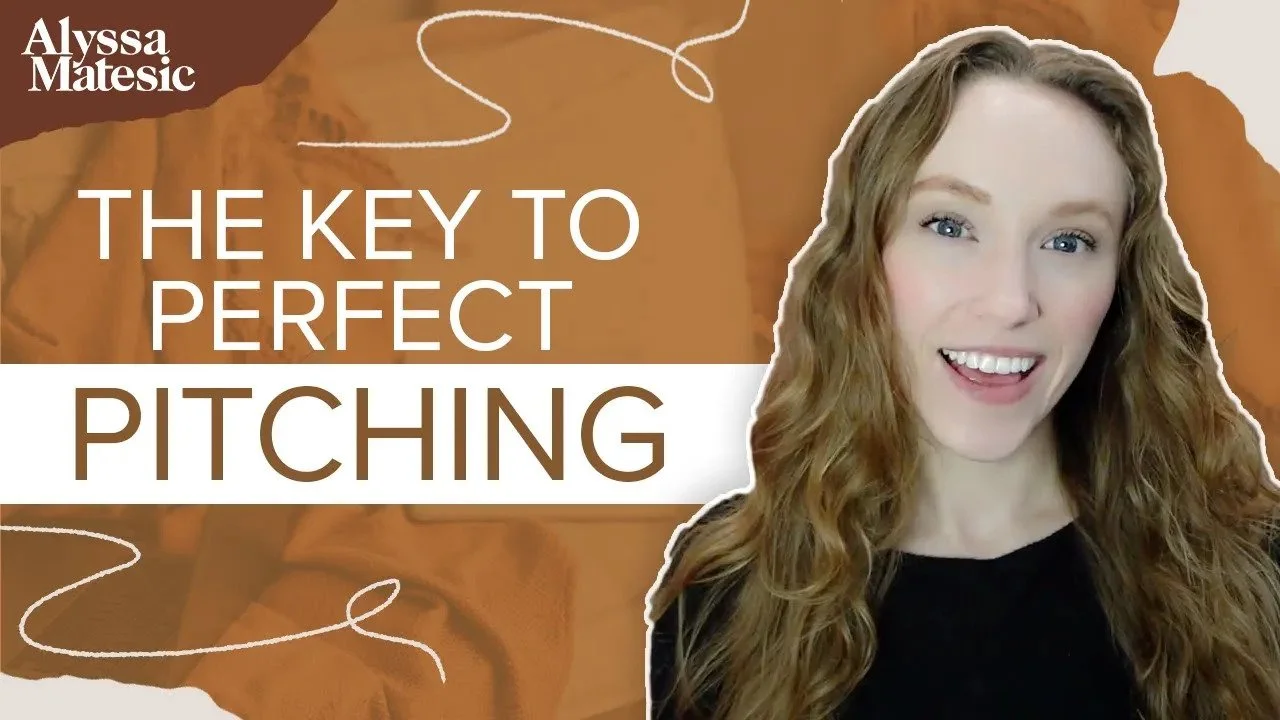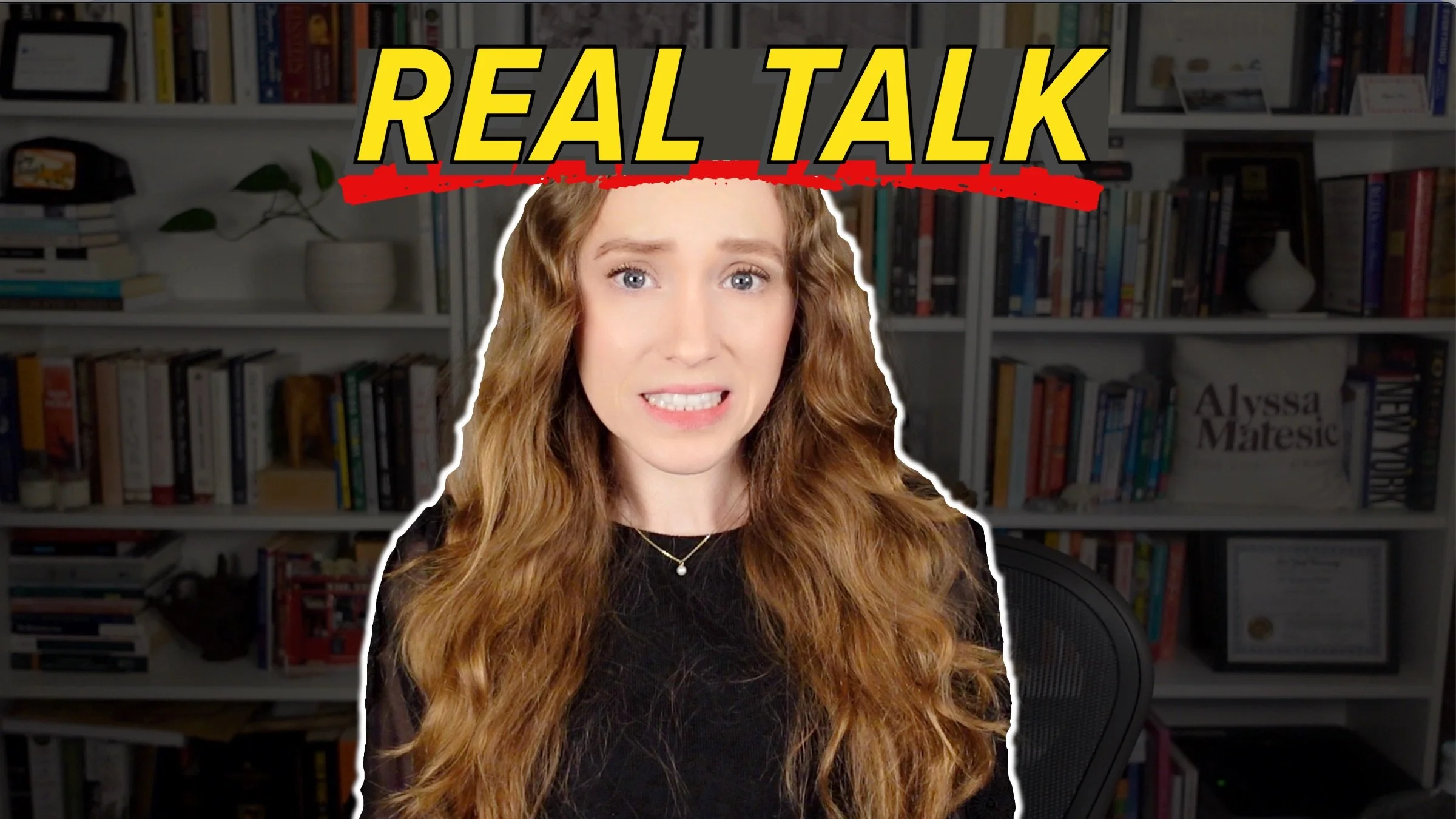How to Pitch a Book – Your Guide to Writing the Perfect Book Pitch
HIT PLAY OR READ THE POST BELOW:
Once you have finished your novel and you are ready to embark on the publishing journey, whether you like it or not, one step you're going to have to take is figuring out how to pitch a book. This goes for whether you are planning to traditionally publish, in which case you are going to have to pitch your book to literary agents via your query letter, or if you are going the self-publishing route, in which case you're ultimately going to have to figure out how to pitch your novel so that readers want to buy it.
I totally understand that pitching can feel awkward, especially if marketing, sales, and advertising do not come naturally to you. It can feel like a chore, and it may seem impossible to distill your complex, layered story into a succinct pitch. It can be hard for you to figure out what your story is even about because to you it's about so many different things!
Despite how hard it is, pitching your novel can make or break your book's success. Even if you have written the best book ever, if there isn't a pitch that draws someone in and makes them want to read it, it's unlikely that it’s going to find any readers at all. So, because pitching is so important, today I want to go over some practical tips for how to write a book pitch that gets literary agents, publishers, or readers as excited about it as you are to bring it to them.
1. Identify the Hook
My first tip for pitching your novel is to identify the hook. Every book has a hook. Even if you are convinced yours does not, even if you didn't write your book with a specific hook in mind, it does have one somewhere in there. The hook is the element that makes a literary agent or a reader go, “Oh my god, I have to read that now!”
You might be thinking, “Well, it's impossible for me to summarize what my book is about in a one-line pitch or a one-line hook. How am I supposed to do that?” It is not about summarizing your entire book in one sentence or one line. The hook is not about describing all of your novel’s themes. It is not about summarizing everything that happens in your book. It's not even about describing all the elements of your plot.
To find your hook, think about what your story offers that is totally unique. Perhaps that's the world that you've crafted, or perhaps it's the protagonist's unique struggles. What is different about your story, and what is going to make readers want to read it? When you’re pitching your book, your hook should encapsulate the premise, essential idea, or inciting element of your plot so that the reader gets some sense of what to expect from it.
Often when crafting your hook, it can also be helpful to think about contrasting elements in your story — forces that are opposing and are working against one another. That's ultimately going to be where the intrigue lies. So, for instance, a hook line could be:
A composer finishing the score for a blockbuster film suddenly loses their hearing.
That's it. We don't know anything else about the story, but that is still an intriguing hook that will likely make some readers want to understand what goes on in that story.
2. Lead with Character
My next tip for writing a book pitch is to lead with character. Anywhere you're pitching your novel, whether that is in your query letter to literary agents or in the blurb you post online when you self-publish your book, I strongly recommend leading with your protagonist(s), which means describing them and the struggle that they are facing.
This is because most readers ultimately want to connect emotionally with the human element of your story. They want to understand and get invested in the people who populate your story because even if you have a compelling plot, if readers aren't connecting with or caring about your characters, it's unlikely they are actually going to finish your book. So, in your book pitch, make us care about your main character or characters. Try to articulate what they are trying to achieve and what is stopping them from achieving that goal. If you orient us to their goals, we're going to understand them on some level, and then we’ll be invested in seeing if they achieve those goals.
Let's talk about the prior example about the composer who is trying to finish the score but then loses their hearing. This pitch would be so much less effective if you just said something like:
Production for a blockbuster film stops when a composer suffers an injury.
Do you see how leading with the protagonist— with the composer's journey and with the composer's struggles — makes that pitch for the same book so much more compelling? It’s because we are invested in seeing what happens to the composer. So, for this reason, whenever you are putting together the book blurb portion of your query letter (or the book description that goes online, if you are self-publishing), start it with a description of your protagonist.
For the composer story, that could look something like:
Struggling composer Ben Smith has one more shot to make his career work, or else he's going to quit for good.
Giving us a snapshot of the state of being for your protagonist is going to immediately give us that human element to connect with, which ultimately is going to translate into a stronger pitch. As we know, emotions move us to act. If we feel connected to this character and are interested in the struggle you're laying out, we're going to be more likely to want to read that book.
3. Describe the Main Conflict
My next tip for how to pitch a book is to describe the main conflict. Your pitch should always, always, always describe the main conflict of your plot because if you provide just a static description of the characters or the setting, and that's the entirety of your pitch, it is unlikely to pique a literary agent’s or a reader's interest.
You have to give us a taste of what we are reading for — what is the journey that's going to unravel? What is the main issue the characters are grappling with? We need that point of tension and intrigue because that is what is going to create suspense, which is what's going to inspire us to keep going and see what happens in the story.
Again, going to the composer example, a poor pitch would be something like:
A struggling composer works on a blockbuster film.
You've taken out the conflict element entirely, and that's not really something that anyone's going to find interesting to read. It doesn't sound exciting. So, wherever you are pitching your book, it is essential to highlight the main conflict of your plot.
Sometimes it can be helpful to think about it in terms of a rhetorical question. Going back to this composer story, that could look something like:
Will Ben figure out how to continue to write music, or will he have to give up his passion forever?
The reason why the rhetorical question works well to present the conflict is because it forces you to lay out different options for how the story could play out, which also helps establish the stakes. We don't want Ben to have to give up his passion forever, so it makes us intrigued to see what happens in the story and see which way the conflict will go.
4. Find Relevant Comp Titles
My next tip for pitching your novel is to find relevant comps. I know comparable titles are the bane of every writer's existence, especially those who are seeking traditional publishing. It might feel unnatural or unrealistic to compare your story to others, or perhaps you simply just don't have a lot of time to read recently published books and therefore you're struggling to come up with any comp titles at all. Maybe you don't even know where to start with finding comp titles.
But comps can be really helpful for pitching your book, whether you’re traditionally publishing or self-publishing. That's because comparable titles help a literary agent or a potential reader understand what to expect from your story and what other audiences it would appeal to. Comps also do double duty because if a literary agent or a reader is a big fan of one of the comps that you come up with, they're immediately going to be that much more interested in reading your story, so it can be a really powerful pitch element.
When pitching your book, the way that I recommend incorporating comps is by saying something like, “My story is X meets Y.” That alleviates the need for you to get hung up on finding one perfect comp because there's not going to be any single perfect comp out there. I promise your book is unique for a reason, so by thinking about it instead as “X meets Y,” you can think about it in terms of what two books (or one book and one movie/TV show) blended together create something like your story. One could have a similar setting while the other could have a similar genre or a similar protagonist. Do some brainstorming, maybe even ask friends if there are any other stories or TV shows or movies that your story reminds them of, and see if you can create that blended comps presentation.
5. Keep It High Level
My final tip for pitching your novel is to keep it high level. You need to accept the fact that you are simply not going to be able to express all the nuances and layers of your story in your book pitch — and you're not supposed to. Oftentimes in a pitch you're going to have to cut out things like the novel’s themes or the intended takeaways. You're likely not going to be able to talk about all the subplots or secondary characters, and that is totally okay.
A literary agent or a reader is going to understand that the pitch is high level and that your story is obviously much more complex than just a one-line pitch. Remember, the function of the novel pitch is just to pique their interest. It is not supposed to reflect the entire scope of the story.
If you're struggling to figure out what to present in your pitch and what to cut or leave out, ask a friend or someone else who has read your book to summarize it for you and see what they come up with. You might be surprised to find that it is not what you come up with on your own. For instance, what they see as the main plot conflict or the main unique element of your story might not be what you thought, and that can then help you craft a distinct pitch.
Also ask them to identify one thing about your book that was different than any other book they've read, and see if you can write a pitch for your novel around that. This can help you find your hook and what makes your story unique.
I hope this helped you feel more confident going out there and pitching your book, whether to literary agents or to readers directly. I know it can be really hard and nerve-wracking to figure out how to pitch your book, but I promise you have what it takes.
Thanks so much for reading and happy writing!






